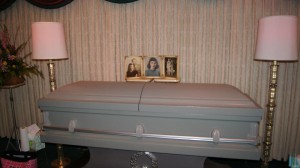Recently, I traveled to my birthplace of Toledo, Ohio, to attend the funeral of my grandmother, Jane Marcy Cole. She died at the age of 88 on Monday, March 25, 2013. She is survived by her husband Ralph, three daughters, six grandchildren, one great-grandchild, and numerous extended family.
One thing that worried me was that she might have chosen to be cremated, but thankfully, this was not the case. In recent times, the number of people—including Christians—who are choosing to undergo this process instead of opting for a traditional burial is on the rise. I think this is lamentable for several reasons.

First, there is the theological reason. The Christian Church in general was against cremation from the beginning, and the Orthodox Church in contrast to most other denominations continues to ban the practice. We are not dualists; we believe that man is a body and a soul united together, not a soul imprisoned inside of a body as did the ancient pagans. It is commonplace today to hear people talk about their soul being the “real self” and the body just being a vehicle or an external container. This is paganism revived, plain and simple, and this idea is an import from Eastern religions. Christians believe in the resurrection of the body; at the end of time, our bodies will be reconstituted and rejoined to our souls, and in this restored form, we will face God in judgment. As such, we bury the dead, because their body is still a temple of the Holy Spirit; it is still a nexus of the spiritual and the physical. The soul has departed from it, but this is only temporary, and as such the body deserves our continued respect.
Second, there is the pastoral reason. We go to funerals not just for the sake of the one who died, but also for our own sake. A funeral serves as a reminder that we are next. We will all pass away at one point or another, so it is important to be ready for it. If we have not repented of various sins, let’s not wait for another day to do it. This is even more vividly experienced at the funeral of a young person who passes suddenly. Being in the presence of the deceased is a jarring but necessary experience which is diminished when he or she is instead presented in a colorful vase or jar. For this reason I am also opposed to closed-casket funerals except in cases of harsh disfigurement. My own grandmother wanted a closed-casket funeral, perhaps because she did not understand these principles, but at least we the close family were allowed to see her body during private viewing hours.
Finally, there is the psychological reason. When I was a teenager, my beloved pet dog Pipper woke up one morning and couldn’t walk anymore. She was seventeen years old—quite advanced for a dog. My father took her in to put her to sleep, and I did not go. For years since I have had recurring dreams of my dog being still alive, or being lost and then found, because I never saw her expire. In contrast, I was present when my other dog Lucy died, and had no such experience. Seeing our deceased love ones face-to-face is important for psychological closure and moving on. It is certainly hard, but it serves a vital purpose. Seeing my grandmother one last time was special for me and made me feel at peace.
I occasionally meet people who have a fear of funerals and dead people, who make comments to the effect that they would skip the funeral of someone they loved in order to just remember them in the way they were when they were alive. To be honest, this strikes me as avoidance and unhealthy, because the person is in effect pretending that a fundamental event common to all of us has not just occurred, that a relationship has not just been fundamentally altered. They also remain aloof from the rest of the family and friends who are in the grief process, and who benefit from the presence of others. Skipping the funerals of loved ones and friends does a disservice to oneself, one’s loved ones, and the deceased.
If you are a Christian and have chosen to be cremated, I strongly encourage you to rethink this choice and opt for a traditional burial, out of respect for your body, and for the sake of your loved ones!